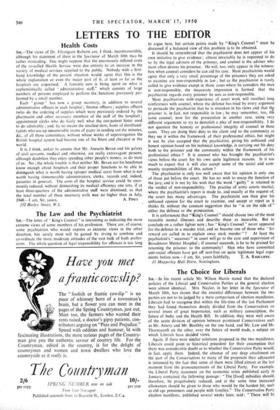The Law and the Psychiatrist
SIR,—The letter of " King's Counsel " is interesting as indicating the more extreme views of some members of his profession. There are, of course, some psychiatrists who would express as extreme views in the other direction, but surely most will be gained by trying to combine and co-ordinate the more moderate attitudes of the vast bulk of both profes- sions. The whole question of legal responsibility for offences is too long to argue here, but certain points made by "King's Counsel" must be discussed if a balanced view of this problem is to be obtained.
It should be remembered that the psychiatrist does not appear of his own initiative to give evidence ; almost invariably he is requested to do so by the legal advisers of the prisoner, and counsel is the adviser who most often desires his presence. He will, too, only appear in the witness- box when counsel considers he can aid his case. Most psychiatrists would agree that only a very small percentage of the prisoners they are asked to examine are non-responsible in law ; but as the psychiatrist is rarely called to give evidence except in those cases where he considers the man is non-responsible, the inaccurate impression is formed that the psychiatrist regards every priioner he sees as non-responsible.
Most psychiatrists with-experience of court work will recollect long conferences with counsel, where the defence has tried by every argument to persuade the psychiatrist that he is mistaken in his views and that the prisoner is, in fact, not responsible in law ; he may remember, too, the same counsel, now for the prosecution in another case, using very different arguments to try to demolish a plea of non-responsibility. I do not question the honesty or professional integrity of counsel in these cases. They are doing their duty to the client and to the community as they see it within the framework of their professional ethics, but might it not be also accepted that the psychiatrist, giving his unbiased and honest opinion based on his technical knowledge, is carrying out his duty both to the prisoner and the community within the framework of his professional ethics 7 It is counsel who hits brought the psychiatrist's views before the court for his own quite legitimate reasons. Is it too much to expect that it will also accept some of the social and com- munity responsibilities of this action ?
The phychiatrist is only too well aware that his opinion is only one of those put before the court. He has no wish to usurp the function of the jury, and it is not by his wish that the word ".guilty " is retained in the verdict of non-responsibility. The practice of army courts martial, where the psychiatrist's report is made to, and usually at the request of, the court has many advantages. The psychiatrist can then give his unbiased opinion for the court to examine, and accept or reject as it thinks fit, without the constant suggestion that he " is on the side of " either the defence or the prosecution.
It is unfortunate that "*IK.ifig's Counsel " should choose two of the most treatable mental illnesses and describe these as incurable. But to conclude on a rather lighter note ; has " King's Counsel " never appeared for the defence in a murder trial, and so become one of those who " for reward are called in to explain away stark murder " ? At least the psychiatrist's " successes" in-court will go to the care and supervision of Broadmoor Mental Hospital ; if counsel succeeds, is he to be praised for returning the prisoner to the community? Men who have committed anti-social offences have got off scot-free on quite legitimate legal argu-
ments before now.-1 am, Sir, yours faithfully, T. A. RADCLIFFE. II Mapperley Hall Drive, Nottingham.


































 Previous page
Previous page